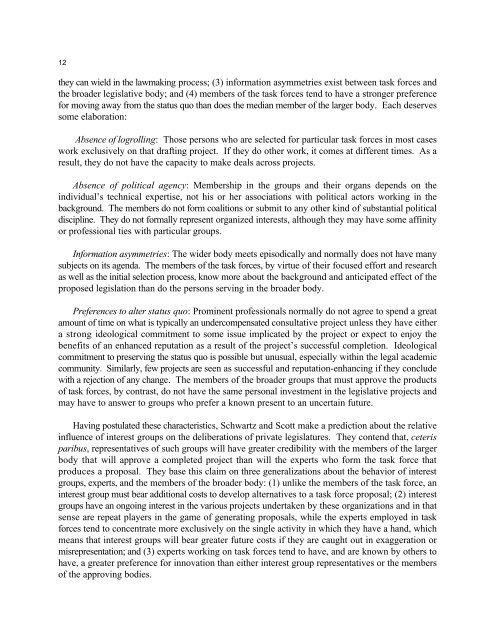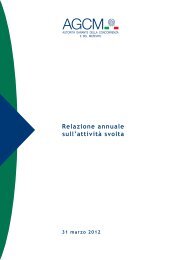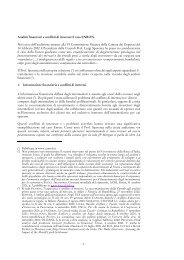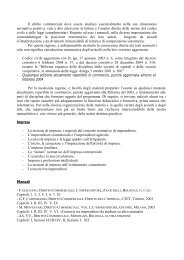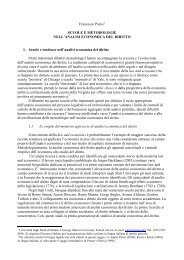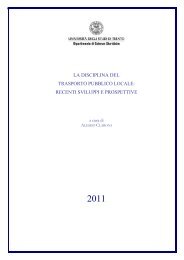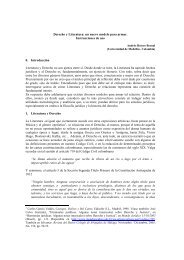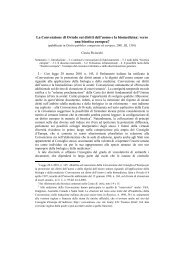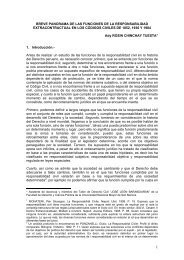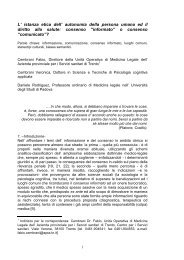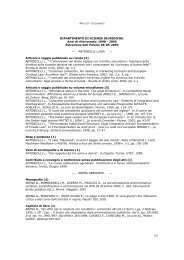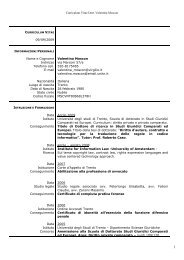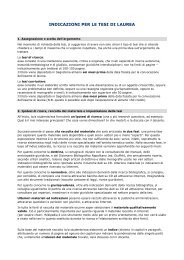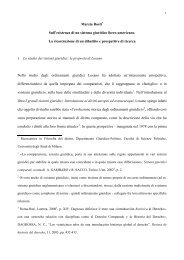The Futility of Unification and Harmonization in International ...
The Futility of Unification and Harmonization in International ...
The Futility of Unification and Harmonization in International ...
Create successful ePaper yourself
Turn your PDF publications into a flip-book with our unique Google optimized e-Paper software.
12they can wield <strong>in</strong> the lawmak<strong>in</strong>g process; (3) <strong>in</strong>formation asymmetries exist between task forces <strong>and</strong>the broader legislative body; <strong>and</strong> (4) members <strong>of</strong> the task forces tend to have a stronger preferencefor mov<strong>in</strong>g away from the status quo than does the median member <strong>of</strong> the larger body. Each deservessome elaboration:Absence <strong>of</strong> logroll<strong>in</strong>g: Those persons who are selected for particular task forces <strong>in</strong> most caseswork exclusively on that draft<strong>in</strong>g project. If they do other work, it comes at different times. As aresult, they do not have the capacity to make deals across projects.Absence <strong>of</strong> political agency: Membership <strong>in</strong> the groups <strong>and</strong> their organs depends on the<strong>in</strong>dividual’s technical expertise, not his or her associations with political actors work<strong>in</strong>g <strong>in</strong> thebackground. <strong>The</strong> members do not form coalitions or submit to any other k<strong>in</strong>d <strong>of</strong> substantial politicaldiscipl<strong>in</strong>e. <strong>The</strong>y do not formally represent organized <strong>in</strong>terests, although they may have some aff<strong>in</strong>ityor pr<strong>of</strong>essional ties with particular groups.Information asymmetries: <strong>The</strong> wider body meets episodically <strong>and</strong> normally does not have manysubjects on its agenda. <strong>The</strong> members <strong>of</strong> the task forces, by virtue <strong>of</strong> their focused effort <strong>and</strong> researchas well as the <strong>in</strong>itial selection process, know more about the background <strong>and</strong> anticipated effect <strong>of</strong> theproposed legislation than do the persons serv<strong>in</strong>g <strong>in</strong> the broader body.Preferences to alter status quo: Prom<strong>in</strong>ent pr<strong>of</strong>essionals normally do not agree to spend a greatamount <strong>of</strong> time on what is typically an undercompensated consultative project unless they have eithera strong ideological commitment to some issue implicated by the project or expect to enjoy thebenefits <strong>of</strong> an enhanced reputation as a result <strong>of</strong> the project’s successful completion. Ideologicalcommitment to preserv<strong>in</strong>g the status quo is possible but unusual, especially with<strong>in</strong> the legal academiccommunity. Similarly, few projects are seen as successful <strong>and</strong> reputation-enhanc<strong>in</strong>g if they concludewith a rejection <strong>of</strong> any change. <strong>The</strong> members <strong>of</strong> the broader groups that must approve the products<strong>of</strong> task forces, by contrast, do not have the same personal <strong>in</strong>vestment <strong>in</strong> the legislative projects <strong>and</strong>may have to answer to groups who prefer a known present to an uncerta<strong>in</strong> future.Hav<strong>in</strong>g postulated these characteristics, Schwartz <strong>and</strong> Scott make a prediction about the relative<strong>in</strong>fluence <strong>of</strong> <strong>in</strong>terest groups on the deliberations <strong>of</strong> private legislatures. <strong>The</strong>y contend that, ceterisparibus, representatives <strong>of</strong> such groups will have greater credibility with the members <strong>of</strong> the largerbody that will approve a completed project than will the experts who form the task force thatproduces a proposal. <strong>The</strong>y base this claim on three generalizations about the behavior <strong>of</strong> <strong>in</strong>terestgroups, experts, <strong>and</strong> the members <strong>of</strong> the broader body: (1) unlike the members <strong>of</strong> the task force, an<strong>in</strong>terest group must bear additional costs to develop alternatives to a task force proposal; (2) <strong>in</strong>terestgroups have an ongo<strong>in</strong>g <strong>in</strong>terest <strong>in</strong> the various projects undertaken by these organizations <strong>and</strong> <strong>in</strong> thatsense are repeat players <strong>in</strong> the game <strong>of</strong> generat<strong>in</strong>g proposals, while the experts employed <strong>in</strong> taskforces tend to concentrate more exclusively on the s<strong>in</strong>gle activity <strong>in</strong> which they have a h<strong>and</strong>, whichmeans that <strong>in</strong>terest groups will bear greater future costs if they are caught out <strong>in</strong> exaggeration ormisrepresentation; <strong>and</strong> (3) experts work<strong>in</strong>g on task forces tend to have, <strong>and</strong> are known by others tohave, a greater preference for <strong>in</strong>novation than either <strong>in</strong>terest group representatives or the members<strong>of</strong> the approv<strong>in</strong>g bodies.


